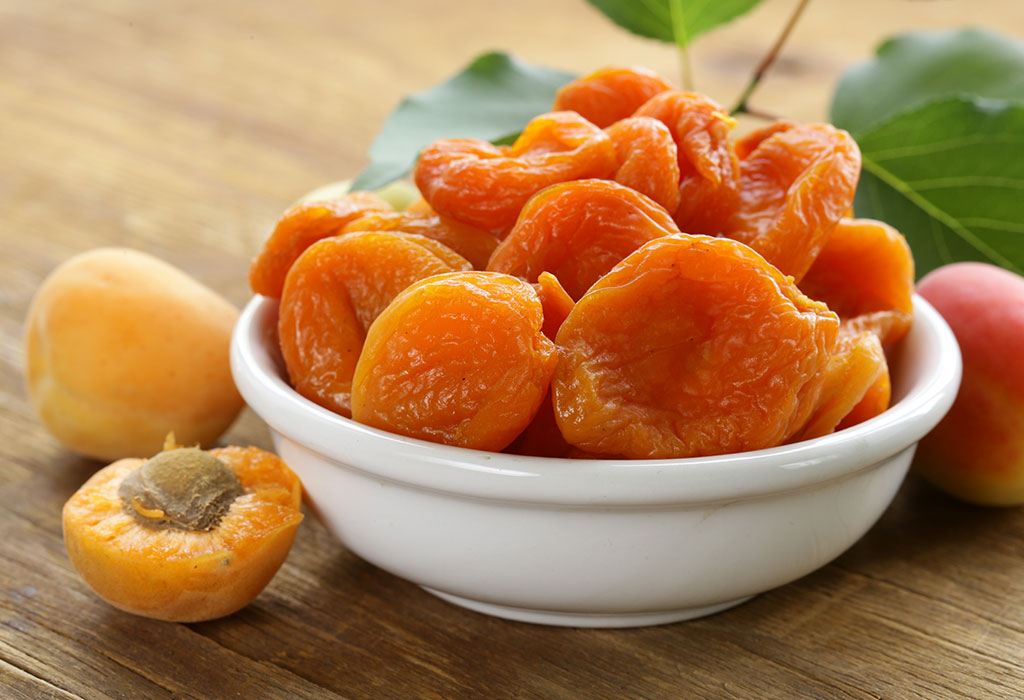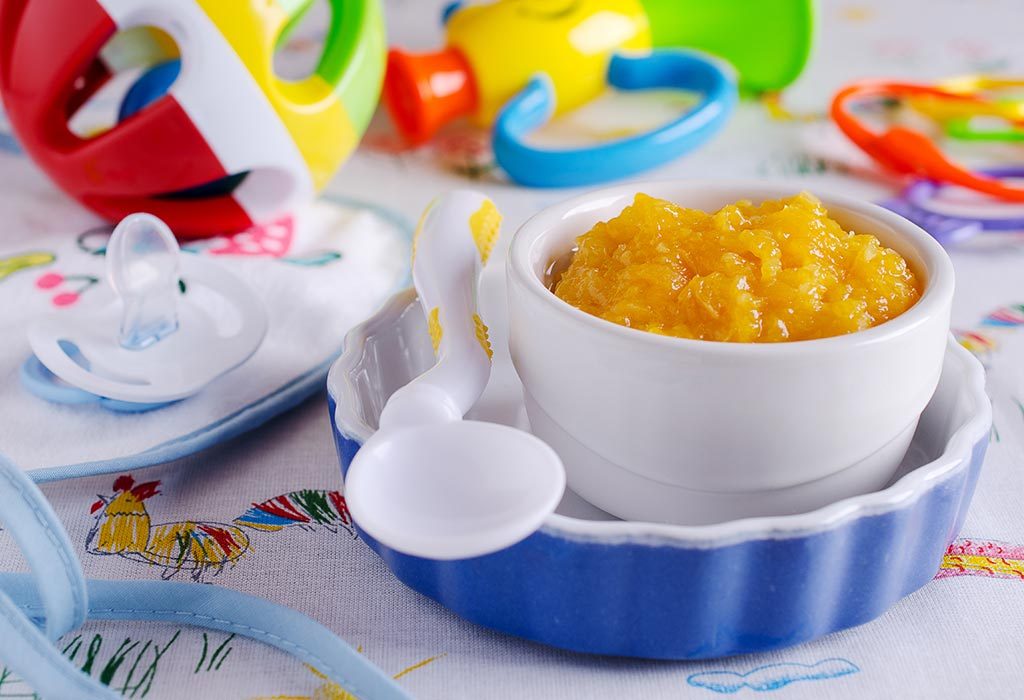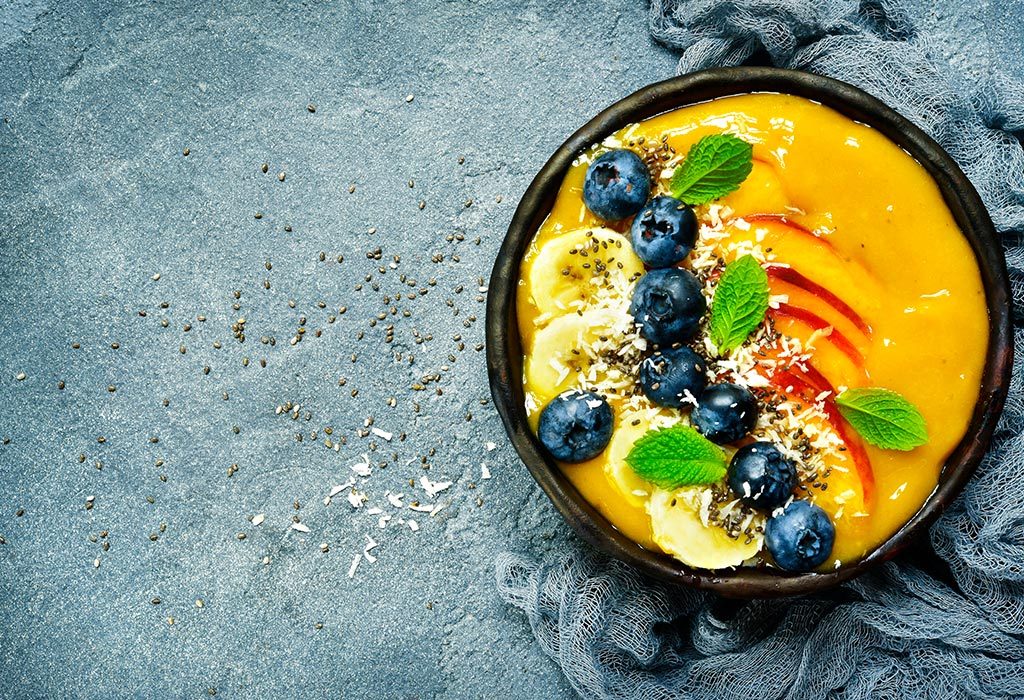In this Article
- When to Introduce Apricots to Infants
- Nutritional Value of Apricots
- How to Choose Apricots for Your Baby
- How to Store Apricots for Baby Food
- Do You Need to Peel Apricots for Your Baby?
- How to Cook Apricots for Baby Food
- Can Apricots Cause Allergies in Babies?
- Precautions to Take while Giving Apricots to Infants
- Apricot Recipes for Babies
Apricots are known for their amazing taste. They resemble peaches and plums when fresh. These fruits can be either consumed fresh or dried. Apricots are a rich source of beta-carotene, fibre and vitamin C, and has other health benefits too. But is this wonder fruit good for babies? Find out here…
When to Introduce Apricots to Infants
Apricots can be a great finger food or can be given as a puree when a baby crosses the 6-month mark. However, if one wishes to, you can introduce apricot to your baby from as early as 4 months, but before you do so remember to consult a paediatrician.
Nutritional Value of Apricots
The fruit is fragrant, juicy when ripe and full of nutrients, minerals, and vitamins.
Nutritive value of 100 grams of fresh apricot:
| Calories | 48 |
| Carbohydrates | 11 g |
| Protein | 1.4 g |
| Fibre | 2 g |
| Fat | 0.4 g |
| Vitamin A | 180 ug |
| Vitamin B6 | 0.054 mg |
| Vitamin C | 10 mg |
| Vitamin E | 0.089 mg |
| Vitamin K | 3.3 ug |
| Calcium | 13 mg |
| Iron | 0.39 mg |
| Magnesium | 10 mg |
| Phosphorus | 23 mg |
| Potassium | 259 mg |
| Sodium | 1 mg |
| Zinc | 0.20 mg |
Source: http://nutritiondata.self.com/facts/fruits-and-fruit-juices/1827/2
Nutritive value of 100 gram dried Apricot
| Calories | 241 |
| Carbohydrates | 63 g |
| Protein | 3.4 g |
| Fibre | 7 grams |
| Fat | 0.5 g |
| Vitamin A | 180 microgram |
| Vitamin B6 | 0.143 mg |
| Folate (B9) | 10 microgram |
| Vitamin C | 1 mg |
| Vitamin E | 4.33 mg |
| Vitamin K | 3.1 microgram |
| Calcium | 55 mg |
| Iron | 2.66 mg |
| Magnesium | 32 mg |
| Phosphorus | 71 mg |
| Potassium | 1162 mg |
| Sodium | 10 mg |
| Zinc | 0.29 mg |
Source: http://nutritiondata.self.com/facts/fruits-and-fruit-juices/1838/2
Benefits of Apricots for Your Baby
Listed below are some amazing health benefits of this wonder fruit.
1. Boost immunity
Apricots are loaded with Vitamin A, hence they help in enhancing the vision of a baby. Giving apricots to your baby will also boost his immunity and shield him from cold, cough, and sickness.
2. Help in clearing bowels
Giving apricots to a baby can provide him relief from constipation. The dietary fibre present in the fruit helps in bowel movement. Giving six to eight portions of this fruit to a baby can provide him relief from constipation.
3. Promote the health of the heart
Apricots help reduce bad cholesterol and increase good cholesterol making your baby’s heart healthy. Moreover, the potassium content in apricots helps balance the electrolyte levels in the body thereby keeping the heart muscles in order.
4. Treat infections
Apricots are a rich source of Vitamin A, which helps in destroying the eggs of the intestinal worms. Vitamin C present in this fruit also makes the body immune and provides resistance to fight all kinds of parasitic infection. Moreover, the fibre present in the fruit helps in eliminating the worms along with the waste through easy bowel movement.
5. Help in the brain development
Apricots contain a good amount of magnesium and potassium; these minerals help in the overall brain development of babies.
6. Cure fever & skin rashes
Apricots have anti-inflammatory properties which help in curing fever and skin problems in babies. Mix apricot juice with water and add a teaspoon of honey to it, stir nicely and give it to the baby to cure fever, cold, cough, and skin rash.
7.Cure respiratory disorders
Since apricot oil is anti-inflammatory and has expectorant qualities, it can prevent and even cure respiratory disorders like asthma in children. All you need to do is massage your child with the oil.
How to Choose Apricots for Your Baby
Note these points before you buy apricots for your baby.
Dried Apricots
- Buy organic dried apricots.
- If you are not buying organic apricots, then make sure there is no sulphur dioxide used to retain the orange colour in non-organic apricots. Sulphur dioxide can cause allergies and respiratory problems in babies.
- Organic apricots are darker than the non-organic ones, so the darker the better.

Canned Apricots
- Choose canned apricots which are not dipped in syrup because that would be too much of unwanted sugar for your baby.
- If buying canned apricot fruit juice, go for the one which does not have sugar.
Fresh Apricots
- Look for the ones that have a golden colour and are firm.
- Avoid buying apricots that are pale yellow or greenish yellow.
- Apricots which are very soft and mushy or look shrivelled should not be bought.
How to Store Apricots for Baby Food
Here are a few tips to store apricots:
- Keep it in the refrigerator to avoid over-ripening of the fruit. In this way, you can keep it fresh for a week.
- If you have left-over of the mashed apricot or puree, refrigerate it in non-BPA containers for 3-4 days.
Do You Need to Peel Apricots for Your Baby?
There is no real need to peel an apricot before giving it to your baby as a finger food or even making a puree of it. The peel of the fruit is velvety in texture and absolutely edible. However, if you do not want your baby to eat the fruit with the outer cover, you can peel it. The easiest way is to put the fruit in boiling water for some time and then dip it in ice water. This procedure will loosen the peel and help it to come off easily.
How to Cook Apricots for Baby Food
Baking apricots are one way to cook them. You need to cut apricots into two halves, remove the seed and keep the cut side down in a baking dish filled with about 1 inch of water. Bake at a temperature of 400°F until the fruit becomes soft.
The other way is by steaming the apricots or putting the fruits in boiling water for a few minutes. After taking the apricots out from the water, run them under cold water and the skin of the fruit easily gets peeled. You can either cut them lengthwise and give your baby as a finger food or mash it up roughly and feed her using a spoon.
Can Apricots Cause Allergies in Babies?
Apricot allergy is rare but it does happen. In case your baby is allergic to apricots, the tongue, lips, face or throat swells up and there may also be a tingling sensation in the mouth. Some children may also suffer severe respiratory problem called anaphylaxis.
In case your baby has birch pollen allergy, eating apricots may cause oral allergy syndrome. Even babies who have had apricots without any problem earlier can suddenly suffer symptoms like itching and irritation of the mouth and throat. However, the symptoms usually subside on its own in most cases in this kind of allergy. In few, the symptoms may persist and aggravate to something severe as anaphylaxis.
We may also come across some children who may suffer from colic after eating apricots. However, this is not because of an apricot allergy, it is a sign of intolerance to apricots. It only means that your baby is unable to digest apricots.
Precautions to Take while Giving Apricots to Infants
Listed below are some precautions that you should take before introducing an apricot into your baby’s diet.
- A time gap of about a week to two weeks is mandatory in between introducing a new food. By doing so, you will know whether your baby is allergic to a certain food or not. In case of an apricot allergy, the baby will show signs like swelling of the face, tongue, lips, throat, and tingling sensation of the mouth and in case of apricot intolerance, the baby may suffer from loose motion or constipation, nausea, stomach ache, bloating and uneasiness.
- If you have kept mashed apricot or puree in the freezer, wait until it thaws and gets back to the room temperature. You should refrain from giving babies anything straight out of the freezer. It is best to give fresh fruit to your baby instead of giving stale fruits.
- Nowadays every fruit that we buy from the market is mostly grown with the help of pesticides. Therefore it is imperative to not just wash the fruit in running water but keep the fruit dipped in water for a good half an hour or more before giving it to your little one.
- Always give ripe apricots to your baby since unripe ones give out toxins which may cause health problems to your baby.
- To retain its orange colour, dried apricots are treated with sulphur dioxide which can be toxic to the baby. Therefore, before giving dried apricots to your baby, always soak it in water for at least half an hour.
Apricot Recipes for Babies
If you are wondering how to make baby food with Apricots, here are some simple recipes you can try.
1. Apple and Dried Apricot Puree
Dried apricots are loaded with antioxidants, nutrients, and minerals and when apples are mixed with it, it makes for a wholesome meal.

Appropriate for Age
6 months and above
Ingredients
- Apricots (dried and soaked in warm water)
- Apples (peeled)
How to Make
- Cut dried apricots and peeled apples into small pieces.
- Boil it in water until they become soft.
- Then put it in a processor and blend to make a puree.
2. Fresh Apricot and Banana puree
Puree made of fresh apricots and bananas is extremely nutritious and babies will love it.
Appropriate for Age Group
6 months and above
Ingredients
- Fresh apricots
- Banana
How to Make
- Cut an apricot in two halves.
- Boil it in water for a few minutes.
- Once it is soft and mushy, take it out and peel the skin.
- Blend both the fruits in a blender and your puree is ready.
3. Mango Apricot Smoothie
Mango and apricot blended together with coconut milk make for a delicious and nutritious smoothie.

Appropriate for Age Group
8 months and above
Ingredients
- A mango
- Dried apricot
- Coconut milk
How to Make it
- Peel and cut the mango in a blender.
- Soak the dried apricots in warm water for at least half an hour and cut them in small pieces.
- Put all the ingredients in a blender and blend it together.
Apricots are one of the best and most nutritious “first weaning foods” for babies. They are also a superb finger food which may be given to babies from the 6thmonth mark. However, precaution should be taken before introducing the fruit to a baby since some may be allergic to it and some may be intolerant towards the fruit.









